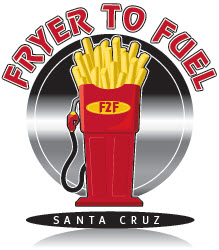Pacific Southwest, Region 9
Serving: Arizona, California, Hawaii, Nevada, Pacific Islands, Tribal Nations
Successful Urban Biodiesel Partnership Model for Communities
Fryer to Fuel Collection Program Flyer English (PDF) (2 pp, 570K) | en Español (PDF) (2 pp, 532K)
EPA awarded a grant to a group of business and government organizations in Santa Cruz, CA in 2006 to fund an innovative pilot project to convert restaurant waste grease into biodiesel for local fleets. Ecology Action, a nonprofit organization, lead this pilot, the first community-based biodiesel production initiative in the United States. Partnering with local restaurants, hauling companies, biodiesel manufacturers, distributors and Santa Cruz’s Department of Public Works, Ecology Action has now successfully completed the project and created a roadmap document for other communities to create locally sustainable biodiesel markets.
With this program firmly established, it is estimated that the production in Santa Cruz alone may get to over 200 thousand gallons of biodiesel per year. That amount can fill the tanks of over 4000 recycling trucks, or enough to fuel a fleet of school buses for the Santa Cruz school district for a year.
The findings describe the successes of this cradle-to-cradle biodiesel production initiative spanning the whole lifecycle from post-consumer feedstock to the user of the fuel:

- Restaurants give their used fryer oil to grease haulers free of charge. The costs of hauling the used grease are now being paid by the biodiesel manufacturers.
- Biodiesel manufacturers use a low-cost, recycled waste feedstock instead of virgin vegetable oil, increasing the sustainability of biodiesel.
- The biodiesel produced in this initiative is used in public fleets and school buses.
This successful initiative simultaneously encourages biodiesel production from post-consumer feedstock, recovers energy, reduces air pollution, and increases diversion of waste oils that are either dumped in landfills or flushed down drains clogging pipes and causing costly sewer spills in wastewater treatment plants. EPA’s Region 9 (Pacific Southwest) is now promoting the best management practices of this community-based project so it becomes a model for other cities and communities across the country.
We would like to help organizations follow Santa Cruz’s example. We are excited to be encouraging alternative fuel use, reduced air pollution, and increased diversion of wastes from landfills. We hope this community-based project will be a model ultimately replicated across the country.
Communities interested in establishing their own urban waste (restaurant grease) to biodiesel initiative are encouraged to contact EPA with questions about developing their own sustainable and cost-effective fryer-to-fuel project.
